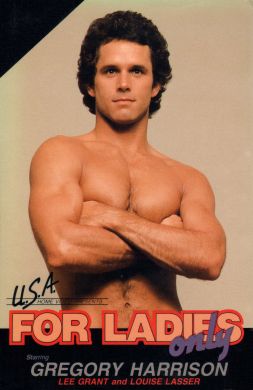
FOR LADIES ONLY
US, 1981, 94 minutes, Colour.
Gregory Harrison, Marc Singer, Steven Keats, Patricia Davis, Dina Manoff, Lee Grant, Vivica Lindfors, Louise Lasser.
Directed by Mel Damski.
For Ladies Only is one of many telemovies made in the late '70s and early '80s which tackled contemporary social problems and moralised. The subject of this film is somewhat sensational - at least exotic. It is the old story of the would-be actor arriving in New York, being rejected and finding hard times and seeking sources of money elsewhere. In this case it is in the male stripping, exotic dancing clubs. With the old story, the plentiful sequences of the dancing and the ultimate moralising, the film verges on the edge of cliche. However, the writing is quite strong, the performances persuasive. Perhaps the ending is just a little too pat.
TV series star Gregory Harrison is convincing in the central role (and was producer of the film). There is good support from Patricia Davis (Ronald Reagan's daughter) and Dinah Manoff. There are good contributions by Lee Grant and Viveca Lindfors. In many ways, the film has its cake as well as eating it.
1. Entertaining telemovie? Familiar material and characters? The moralising? The blend of sensationalism and realism? The impact for the home audience?
2. The title and its use - the women audience at Club Max? The emphasis on ladies? The show and its response? The theme song and lyrics? The atmosphere of Club Max? The irony of male-female relationships – especially in sexual teasing and exploitation? Traditional roles of women with the response of men? The reversal of roles and audience response to the breaking through of its stereotypes?
3. The film's focus on the dancing and stripping? The traditional female performances? The men and the relationship with women? The gigolo tradition? The emphasis on the physical, the sensual, sexual? The style of the acts and the dancing, clothes and decor? Disco dancing? The audience giving money to the dancers? The topless waiters? The ironies as regards roles and stereotypes, the upsetting up expectations? Female striptease and accusations of sexism? Is this true for male strippers? The visualising of the exciting female response? The film's moralising judgment on male stripping? Gregory Harrison in the central role - as producer, actor, stripper and dancer?
4. The introduction to New York? The colour photography of the streets, hotels, theatres, drama schools, clubs? The authentic feel of the New York streets?
5. The traditional showbiz story - with variations? The would-be star, scholarship, accommodation, walking the streets for agents, jobs, auditions? The Midwest background? The struggle? Temptations? Succumbing to temptation and things working out well at the end?
6. John Philips and his arrival in the bus, his hopes, scholarship, looking at New York, finding accommodation, going to agents? The encounter with Sandy and his charming her? The whittling down of the thousand dollars? Presenting references, photos - for the garbage tin? Admiration of Marlon Brando and his audition with Streetcar Named Desire scenes? In himself, personality, abilities? The attack on him at his audition at Rachel's drama school? The class reaction? His charming Sandy and gaining her support? The encounter with Mary Louise at the bar, the affair with her? The collage of his studying Jazz Ballet and moving into jobs with the various frustrations and knockbacks?
7. The seeming hopelessness and his ability to cope? The support of the two girls? Friendship with Stanley? The comments of Rachel? Stanley's proposition about the Club Max? His reaction of disbelief? His going - fear, enjoying himself as waiter? The credibility of the transition to dancer? His work as waiter, sex object and the remarks of the women, the propositions? The opportunity for dancing - initial shyness, his ability, becoming a star? Winning the contest? The reaction of the women? The move from exotic dancer to gigolo? His affair with the lonely married woman? With the wealthy woman after the strip at the party? Her proposition to him so that he could be kept and train as a student? His not wanting to be bought? The repercussions of his stardom for his career?
8. The atmosphere of the club - the screaming women, the lonely wives, the bumps and grinds and strip, the screaming, the kissing? The jokes, the lewdness? The glamorous style? The compere? The various men and their backgrounds to dancing? John becoming more and more at home in this scene? The background of Stanley and his repetitive act, not winning the competition, the drugs, the police raid and his decision to kill himself? The raid by the police? The closing down of the club? The comment on the club by its being raided? Easy temptation for John, quick money, relationships? Unfulfilling?
9. The highlighting of John's dramatic career and the hopes for success after his competition win? Mary Louise and the audition and her gaining a contract for a play? The lonely women? John's not telling Sandy the truth and her discovering it? The TV exploitation., interviews? His being rejected from his audition? The lack of opportunity?
10. Mary Louise and her comic style, going home with John, the affair, jealousy, later friendship? Sandy and her devotion to John, falling in love? The contrast with the lonely women?
11. The end with his audition, small role, applause, legitimate theatre?
12. An enjoyable story? Quality of characterisation? Glimpse of an exotic subculture? The moralising about career and integrity?